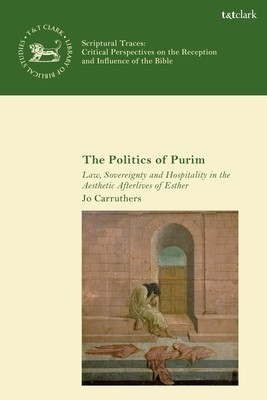
- We will send in 10–14 business days.
- Author: Jo Carruthers
- Publisher: Bloomsbury Publishing PLC
- ISBN-10: 0567691861
- ISBN-13: 9780567691866
- Format: 16.3 x 23.6 x 2.3 cm, hardcover
- Language: English
- SAVE -10% with code: EXTRA
The Politics of PurimLaw, Sovereignty and Hospitality in the Aesthetic Afterlives of Esther (e-book) (used book) | bookbook.eu
Reviews
Description
This book approaches the holiday of Purim as profane, freed to human use and ends, in order to consider the political legacy of the biblical story of Esther in festival and art works. Jo Carruthers explores carnival and synagogue practices, the purimshpiln(Purim's own dramatic genre), illuminated Esther scrolls, as well as artworks by Botticelli, Millais and Jan Steen. The complex and astute interrogation of political life in such festival and artworks is analysed through theories of sovereignty, law, precarity and hospitality by key political thinkers such as Giorgio Agamben, Hannah Arendt, Walter Benjamin, Judith Butler, Jacques Derrida, and Jacques Rancière.
Carruthers considers different motifs of boundary conservation and dissolution, as a means of contemplating the political implications of Purim and the Esther story for diaspora politics. How is sovereignty aspired to and attained by marginalized and threatened communities? How can one respond to the ethical call of hospitality to relax sovereign boundaries whilst protecting and celebrating that which is exceptional? The practice of giving gifts, mishloach manos, offers a model of hospitality that together with Purim's profane impulse is epitomized in the final chapter's discussion of a 2018 Brooklyn purimshpil, that offers a riotous ridiculing of white supremacist rhetoric, norms of domination, capitalist inequalities, modern slavery and ablest identities and assumptions.
EXTRA 10 % discount with code: EXTRA
The promotion ends in 19d.16:36:02
The discount code is valid when purchasing from 10 €. Discounts do not stack.
- Author: Jo Carruthers
- Publisher: Bloomsbury Publishing PLC
- ISBN-10: 0567691861
- ISBN-13: 9780567691866
- Format: 16.3 x 23.6 x 2.3 cm, hardcover
- Language: English English
This book approaches the holiday of Purim as profane, freed to human use and ends, in order to consider the political legacy of the biblical story of Esther in festival and art works. Jo Carruthers explores carnival and synagogue practices, the purimshpiln(Purim's own dramatic genre), illuminated Esther scrolls, as well as artworks by Botticelli, Millais and Jan Steen. The complex and astute interrogation of political life in such festival and artworks is analysed through theories of sovereignty, law, precarity and hospitality by key political thinkers such as Giorgio Agamben, Hannah Arendt, Walter Benjamin, Judith Butler, Jacques Derrida, and Jacques Rancière.
Carruthers considers different motifs of boundary conservation and dissolution, as a means of contemplating the political implications of Purim and the Esther story for diaspora politics. How is sovereignty aspired to and attained by marginalized and threatened communities? How can one respond to the ethical call of hospitality to relax sovereign boundaries whilst protecting and celebrating that which is exceptional? The practice of giving gifts, mishloach manos, offers a model of hospitality that together with Purim's profane impulse is epitomized in the final chapter's discussion of a 2018 Brooklyn purimshpil, that offers a riotous ridiculing of white supremacist rhetoric, norms of domination, capitalist inequalities, modern slavery and ablest identities and assumptions.


Reviews